- Home
- About Us
- Prominent Supporters
- High Profile Supporters
- Douglas Booth
- In photos: Douglas Booth visits refugees and IDPs in Iraq
In photos: Douglas Booth visits refugees and IDPs in Iraq
In November 2016 UNHCR High Profile Supporter Douglas Booth travelled to Iraq to visit refugees and internally displaced persons. He reflected on his experiences via the UNHCR Instagram account. The images and captions from Douglas' posts can be viewed below.
-
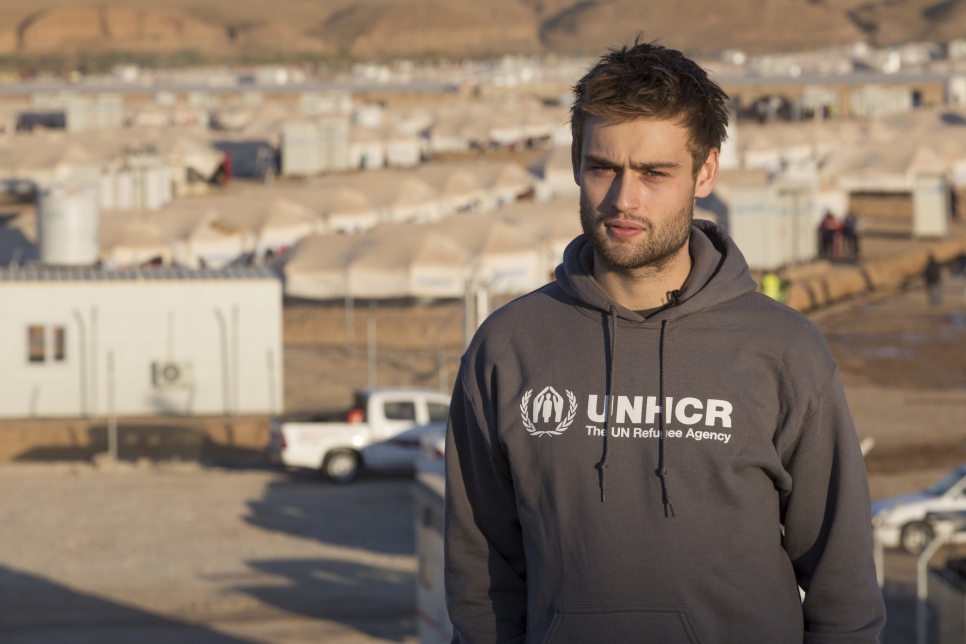 "Hello. I'm Douglas Booth. Last year I travelled to the Greek island of Lesvos with UNHCR and met refugees who felt they had no option but to make the treacherous sea crossing to Europe in order to find a safer future. I wanted to understand more about the situation being faced by people around the world who are forced to flee their homes because of conflict. I came here to Iraq to meet with Syrian refugees as well as Iraqis recently displaced by the fighting in Mosul – 10,000 of whom now live in Hasamsham camp behind me. I'm going to be posting photos and stories from my visit here on Instagram and I'd love you to join me on this journey." © UNHCR/Jordi Matas
"Hello. I'm Douglas Booth. Last year I travelled to the Greek island of Lesvos with UNHCR and met refugees who felt they had no option but to make the treacherous sea crossing to Europe in order to find a safer future. I wanted to understand more about the situation being faced by people around the world who are forced to flee their homes because of conflict. I came here to Iraq to meet with Syrian refugees as well as Iraqis recently displaced by the fighting in Mosul – 10,000 of whom now live in Hasamsham camp behind me. I'm going to be posting photos and stories from my visit here on Instagram and I'd love you to join me on this journey." © UNHCR/Jordi Matas -
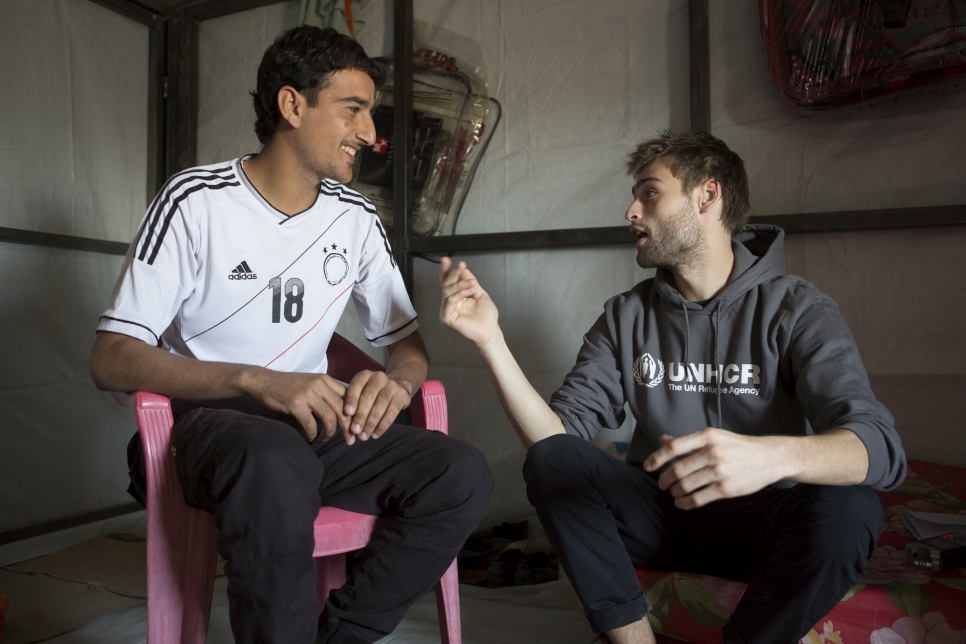 "Abdallah is the same age as me. He is Iraqi and he escaped Mosul with his family 15 days ago. After 2 years of living under the rule of extremists he was visibly relieved and excited to be free from their control. He told me of the frustration of not being able to complete his education, of being forced to grow a beard and wear particular clothes, of beatings and worse for people that were caught disobeying the new rules, of periods of lost hope and times when life seemed meaningless. But he also told me of beautiful moments of defiance. He married a girl from his village, he trimmed his beard for the ceremony and the family celebrated behind black-out blinds at home, secretly playing banned music." © UNHCR/Jordi Matas
"Abdallah is the same age as me. He is Iraqi and he escaped Mosul with his family 15 days ago. After 2 years of living under the rule of extremists he was visibly relieved and excited to be free from their control. He told me of the frustration of not being able to complete his education, of being forced to grow a beard and wear particular clothes, of beatings and worse for people that were caught disobeying the new rules, of periods of lost hope and times when life seemed meaningless. But he also told me of beautiful moments of defiance. He married a girl from his village, he trimmed his beard for the ceremony and the family celebrated behind black-out blinds at home, secretly playing banned music." © UNHCR/Jordi Matas -
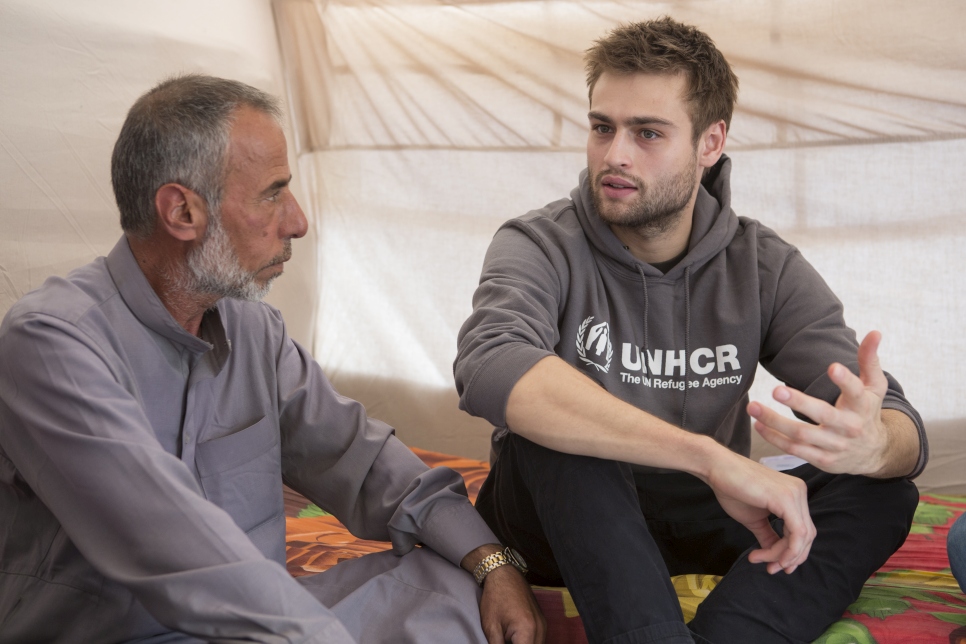 "Hussein is head of a family that is in a state of deep, raw grief. The night they planned to escape Mosul – just a week ago - a mortar hit their home killing the youngest of his three daughters. Her name was Saja. She died of her injuries in her mother's arms. Hussein, her sisters and her brother, Ali, looking on. Ali told me that "Saja was so incredibly smart, she had so many dreams, she had so much that she wanted to achieve. She had collected together all of her academic awards and certificates, her bags were packed, she was ready to leave, we were being liberated. And she didn't make it. When you see your sister die in front of you it is the worst thing that can ever happen to you" © UNHCR/Jordi Matas
"Hussein is head of a family that is in a state of deep, raw grief. The night they planned to escape Mosul – just a week ago - a mortar hit their home killing the youngest of his three daughters. Her name was Saja. She died of her injuries in her mother's arms. Hussein, her sisters and her brother, Ali, looking on. Ali told me that "Saja was so incredibly smart, she had so many dreams, she had so much that she wanted to achieve. She had collected together all of her academic awards and certificates, her bags were packed, she was ready to leave, we were being liberated. And she didn't make it. When you see your sister die in front of you it is the worst thing that can ever happen to you" © UNHCR/Jordi Matas -
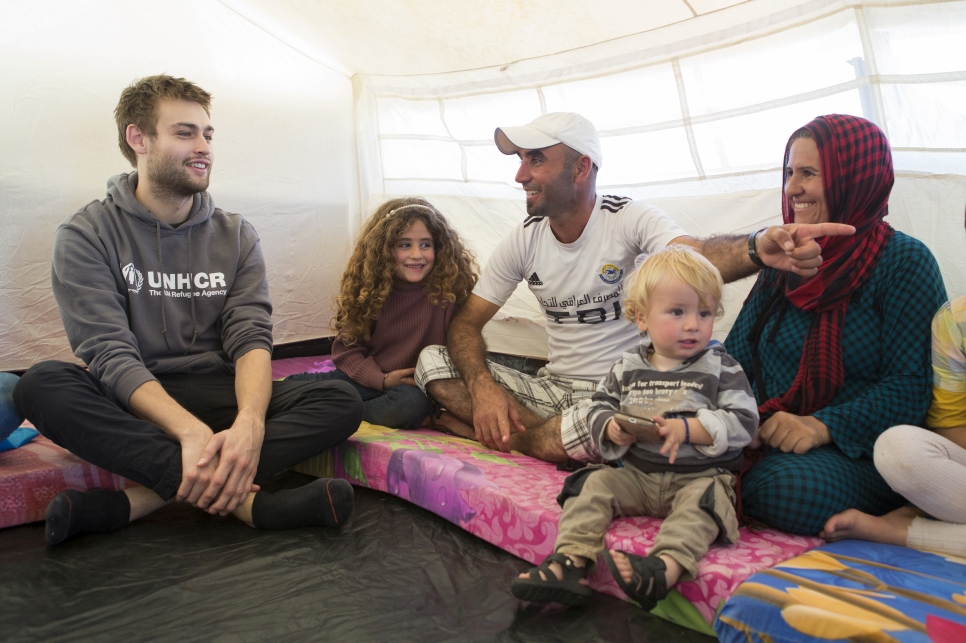 "Meet Amar. A wonderful man with a beautiful, smiling family. He was hopeful about the future of Iraq – hopeful that the country will find peace - hopeful that Iraqis will build a safe and comfortable future for their children. He says that Iraq is full of good people. Full of kind people. He said the Iraq he wants to get back to is one where Christians and Muslims and Kurds and all religions and ethnicities live together, eat together, laugh together." © UNHCR/Jordi Matas
"Meet Amar. A wonderful man with a beautiful, smiling family. He was hopeful about the future of Iraq – hopeful that the country will find peace - hopeful that Iraqis will build a safe and comfortable future for their children. He says that Iraq is full of good people. Full of kind people. He said the Iraq he wants to get back to is one where Christians and Muslims and Kurds and all religions and ethnicities live together, eat together, laugh together." © UNHCR/Jordi Matas -
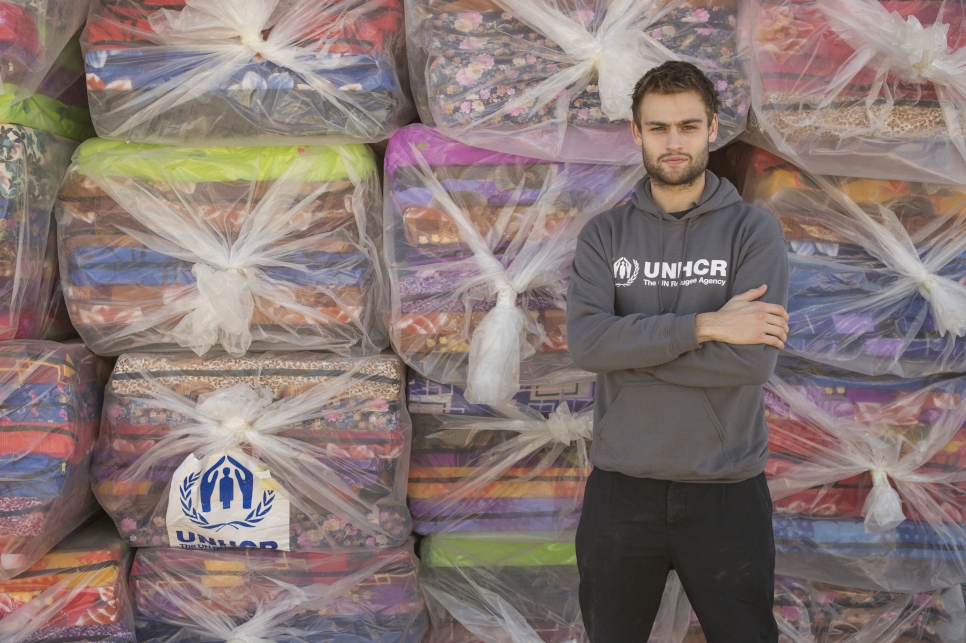 "A mountain of mattresses. When families fleeing Mosul first arrive in camps UNHCR provides them with the 'core relief items' they need to survive: a tent, mattresses, blankets, a cooking stove, jerry cans for water, kitchen and hygiene kits. When you have lost everything in the frenzy and chaos of fleeing you need to start again with the very basics. Dignity sometimes comes in the smallest and simplest of packages – a bar of soap, a tooth brush and tooth paste to feel clean again, shelter for privacy and protection from the elements, the facilities to make a meal for your family." © UNHCR/Jordi Matas
"A mountain of mattresses. When families fleeing Mosul first arrive in camps UNHCR provides them with the 'core relief items' they need to survive: a tent, mattresses, blankets, a cooking stove, jerry cans for water, kitchen and hygiene kits. When you have lost everything in the frenzy and chaos of fleeing you need to start again with the very basics. Dignity sometimes comes in the smallest and simplest of packages – a bar of soap, a tooth brush and tooth paste to feel clean again, shelter for privacy and protection from the elements, the facilities to make a meal for your family." © UNHCR/Jordi Matas -
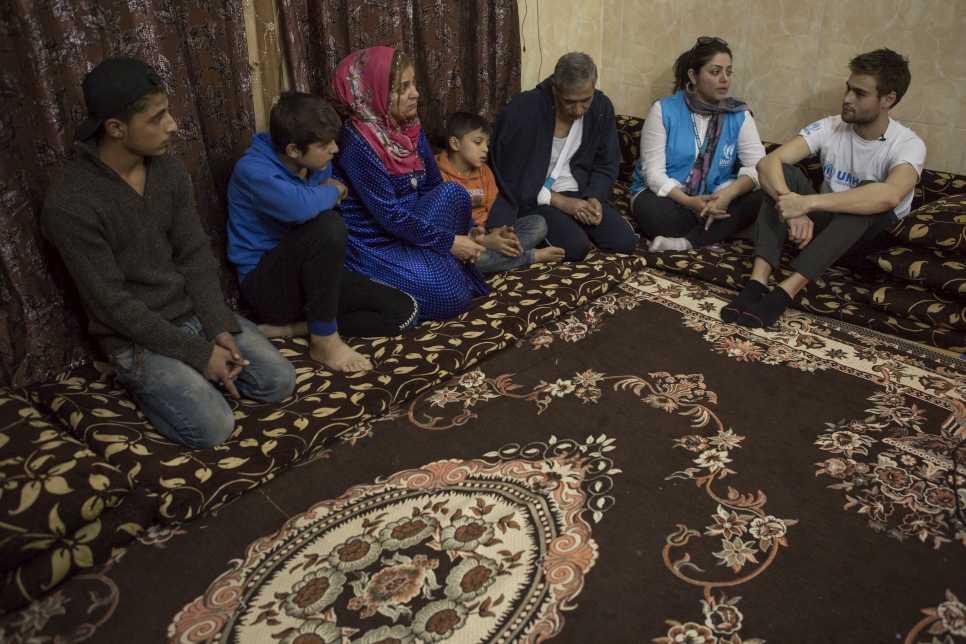 "I think I was hit hardest by the story of this family. Not because their story was so far removed from the stories of loss and struggle of so many others but because they seemed to have lost all hope. They are exhausted, they are worn down, they are close to being defeated by the daily fight for survival. Khaled, the father, has cancer and is unable to work so it falls to the two eldest boys, Mahmoud (15) and Waleed (13) to provide for the family. The boys work 12 hours a day, 7 days a week carrying and delivering heavy goods and stock at the local souk. There is no time for school, no time for playing with friends, no time for anything other than work and sleep. Mahmoud said "the war has stolen everything from me – my mind, my dreams, my hopes for a normal life". Despite receiving limited cash assistance from UNHCR they are barely covering their expenses and debt is mounting with their father's medical bills. Yathrib, their mother, told me with tear-filled eyes that her children have been robbed of their childhood and that she feels that she has failed them as a mother. She hasn't of course. She has kept the family together and she is doing the very best that she can in impossibly hard circumstances that are well beyond her control." © UNHCR/Jordi Matas
"I think I was hit hardest by the story of this family. Not because their story was so far removed from the stories of loss and struggle of so many others but because they seemed to have lost all hope. They are exhausted, they are worn down, they are close to being defeated by the daily fight for survival. Khaled, the father, has cancer and is unable to work so it falls to the two eldest boys, Mahmoud (15) and Waleed (13) to provide for the family. The boys work 12 hours a day, 7 days a week carrying and delivering heavy goods and stock at the local souk. There is no time for school, no time for playing with friends, no time for anything other than work and sleep. Mahmoud said "the war has stolen everything from me – my mind, my dreams, my hopes for a normal life". Despite receiving limited cash assistance from UNHCR they are barely covering their expenses and debt is mounting with their father's medical bills. Yathrib, their mother, told me with tear-filled eyes that her children have been robbed of their childhood and that she feels that she has failed them as a mother. She hasn't of course. She has kept the family together and she is doing the very best that she can in impossibly hard circumstances that are well beyond her control." © UNHCR/Jordi Matas -
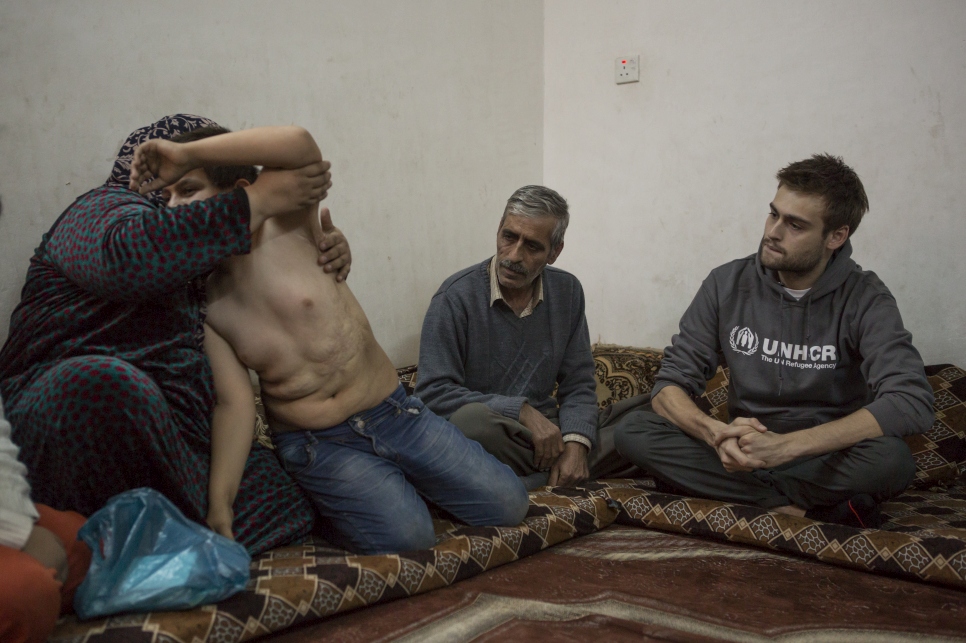 "Abu Mohammad & family (part 1) - 8 year old Abdel Rahman shows me the scars from injuries and burns he suffered when a car bomb exploded outside his home in Syria one night two years ago. The family rushed Abdel Rahman to hospital on foot and from there they fled to Turkey for urgent medical treatment. They never returned home." © UNHCR/Jordi Matas
"Abu Mohammad & family (part 1) - 8 year old Abdel Rahman shows me the scars from injuries and burns he suffered when a car bomb exploded outside his home in Syria one night two years ago. The family rushed Abdel Rahman to hospital on foot and from there they fled to Turkey for urgent medical treatment. They never returned home." © UNHCR/Jordi Matas -
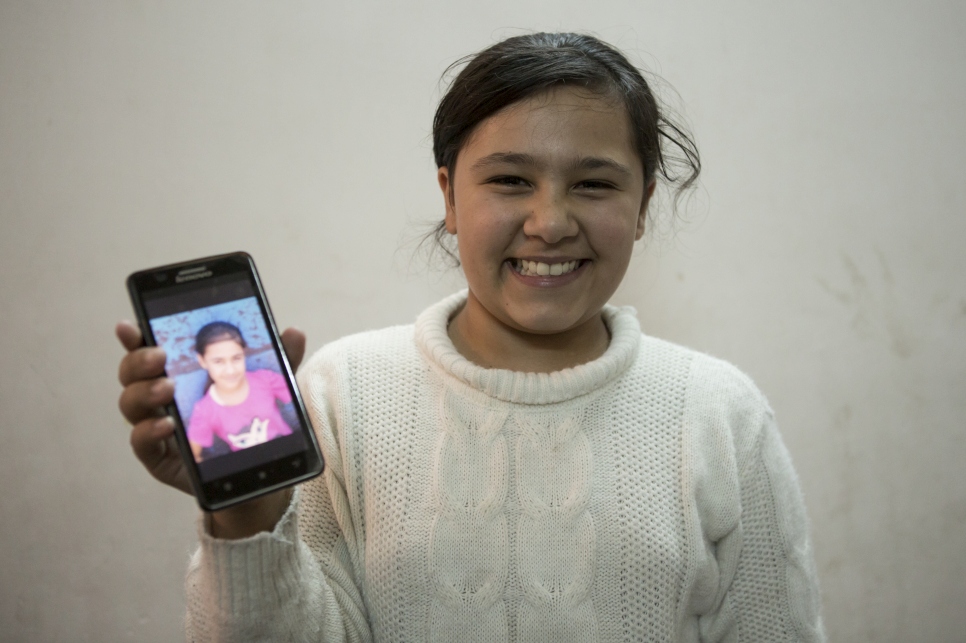 "Abu Mohammad & family (part 2) - The night the car bomb exploded outside their home severely injuring Abdel Rahman, his younger sister, Aziza, was left behind in the chaos and mayhem and shock of fleeing. By the time the family realised Aziza was missing they couldn't go back because the fighting had closed off the routes home. For two years the family had no news of Aziza. They had assumed the worst. Then, 2 months ago, they had a phonecall from a neighbour back in Syria saying that Aziza was alive. This is Gulistan, Aziza's identical twin sister, holding a recent photo of Aziza. The family is now anxious to be reunited with her but the process seems far from straightforward. UNHCR is providing support and legal assistance and I desperately hope that soon the family will be complete again and living together in safety in Erbil." © UNHCR/Jordi Matas
"Abu Mohammad & family (part 2) - The night the car bomb exploded outside their home severely injuring Abdel Rahman, his younger sister, Aziza, was left behind in the chaos and mayhem and shock of fleeing. By the time the family realised Aziza was missing they couldn't go back because the fighting had closed off the routes home. For two years the family had no news of Aziza. They had assumed the worst. Then, 2 months ago, they had a phonecall from a neighbour back in Syria saying that Aziza was alive. This is Gulistan, Aziza's identical twin sister, holding a recent photo of Aziza. The family is now anxious to be reunited with her but the process seems far from straightforward. UNHCR is providing support and legal assistance and I desperately hope that soon the family will be complete again and living together in safety in Erbil." © UNHCR/Jordi Matas -
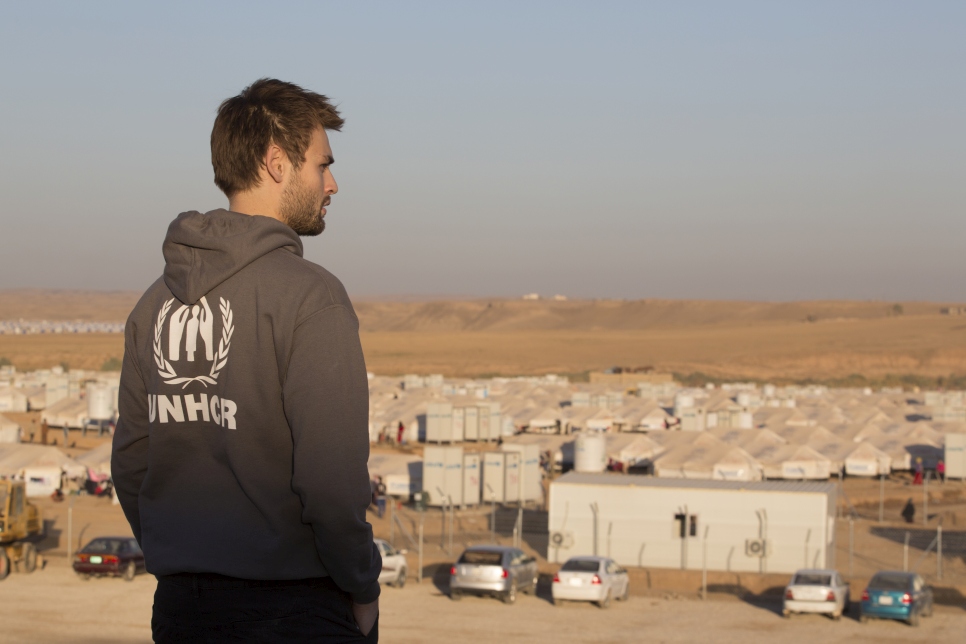 "There are over 225,000 Syrian refugees in Iraq and a further 3.2 million Iraqis who have been forced to flee their homes because of conflict. The economic and security situation across the country is extremely challenging. Despite hearing stories of extreme hardship, sorrow, loss, grief and frustration I left Iraq with some hope, amazed by the generosity, kindness, compassion, tolerance and welcome from different ethnic Iraqis towards Syrians and towards each other. I have been so impressed by the work and staff of UNHCR in supporting and protecting families who, through no fault of their own, are having to start their lives again from scratch. I have been reminded that there is no action too small to make a collective, positive difference and that we can all do more." © UNHCR/Jordi Matas
"There are over 225,000 Syrian refugees in Iraq and a further 3.2 million Iraqis who have been forced to flee their homes because of conflict. The economic and security situation across the country is extremely challenging. Despite hearing stories of extreme hardship, sorrow, loss, grief and frustration I left Iraq with some hope, amazed by the generosity, kindness, compassion, tolerance and welcome from different ethnic Iraqis towards Syrians and towards each other. I have been so impressed by the work and staff of UNHCR in supporting and protecting families who, through no fault of their own, are having to start their lives again from scratch. I have been reminded that there is no action too small to make a collective, positive difference and that we can all do more." © UNHCR/Jordi Matas -
 "I have just returned from Iraq where I met with Syrian refugees and Iraqis recently displaced by the fighting in Mosul. To share my visit with you I'll be posting photos and stories - visit @unrefugees to see the full series, and thank you for joining me there on this journey. I was so struck by how warm and welcoming everyone was in Hasamsham camp. So many parents in Mosul were so worried about their children either being radicalized or abused by the extremists that they kept their children, especially girls, inside the home. Here in Hasamsham, for the first time in two years, parents felt safe to let their kids play outside alone, for their daughters to walk freely." © UNHCRJordi Matas
"I have just returned from Iraq where I met with Syrian refugees and Iraqis recently displaced by the fighting in Mosul. To share my visit with you I'll be posting photos and stories - visit @unrefugees to see the full series, and thank you for joining me there on this journey. I was so struck by how warm and welcoming everyone was in Hasamsham camp. So many parents in Mosul were so worried about their children either being radicalized or abused by the extremists that they kept their children, especially girls, inside the home. Here in Hasamsham, for the first time in two years, parents felt safe to let their kids play outside alone, for their daughters to walk freely." © UNHCRJordi Matas
